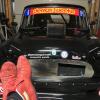Brake Fluid Issue
#1

Posted 25 January 2023 - 11:54 AM
So after replacing my front brake discs, seals, pistons, pads and rings on my 2000 Mini MPI Sport, I note that the front brakes don’t work. I have bled the system with a pressure bleeder (started with the brake the furthest away from the master cylinder and worked my way up to the brake the closest thereto).
I note that the pads move ever so slightly but don’t make contact with the brake discs, and that the fluid in my reservoir comes up (and even overflowing a tiny bit), while pressing the brake pedal. I would say that this is an issue with air in the system, but don’t understand why, as I bled the system (more than once). What would explain the fluid coming up, is there really still air in the system? Is there perhaps an issue with the brake master cylinder?
Any input would be much appreciated.
Thank you in advance as always.
Regards,
TheHunterHofman
#2

Posted 25 January 2023 - 12:46 PM
The fluid reservoir is open to the brake lines until you push the pedal and the piston is pushed past the reservoir outlet. On a dual circuit master cylinder (under normal operation), the piston farthest from the pedal is pushed by the hydraulic pressure in the circuit nearest the pedal, so it needs cup seals at both ends. If the seal on the pushed end fails, the rear (i.e. nearest the pedal) piston could be able to push fluid back in to the reservoir via the outlet for the front circuit.
The rear piston has an extension that will make mechanical contact with the front piston, in the event of pressure loss in the rear circuit, so the front circuit continues to operate.
If you're having persistent problems with hydraulics, you could make up some stops for isolating parts of the circuit to eliminate, and so locate, where the problem is. A brake union with a short length of pipe crimped over a few times screwed in, in place of the rear line on the master would confirm if your symptoms are from within the master, by eliminating any possible external causes.
#3

Posted 25 January 2023 - 12:57 PM
#4

Posted 25 January 2023 - 01:46 PM
Seals have gone in the MC.
#5

Posted 29 January 2023 - 01:23 PM
This is very useful information, thanks all. Will follow-up when fixed.
#6

Posted 01 February 2023 - 06:32 PM
What could this issue be? Does it have anything to do with a vacuum line? What about the brake servo? Electronics? Happy to hear your thoughts.
Thanks in advance, all.
#7

Posted 01 February 2023 - 06:38 PM
What could this issue be? Does it have anything to do with a vacuum line? What about the brake servo? Electronics? Happy to hear your thoughts.
Thanks in advance, all.
#8

Posted 01 February 2023 - 06:38 PM
What could this issue be? Does it have anything to do with a vacuum line? What about the brake servo? Electronics? Happy to hear your thoughts.
Thanks in advance, all.
#9

Posted 01 February 2023 - 09:24 PM
Another tip is to clamp off each flexi hose, if the pedal improves once clamped you've found the problem corner.
I've also had to 'chase' the air along lines, bleeding at each union until fluid weeps out, nipping back up a little tighter than before and going to the next junction.
There is no electronics on the MPI brake system
#10

Posted 02 February 2023 - 03:32 PM
I didn't pick up on it being a late model with a horizontal servo ![]()
I suppose that could cause problems, but only if the servo was holding some vacuum. If the engine isn't run, or the hose isn't connected, it would lose that in a few operations.
The only other place you'd be able to squirt fluid from one circuit in to the other is the FAM7821 regulator valve. Doesn't seem very likely to me.
#11

Posted 02 February 2023 - 11:48 PM
If a dual system did you pre-bleed /bench-bleed the new MS before applying it to the system?
#12

Posted 04 February 2023 - 08:12 PM
If a dual system did you pre-bleed /bench-bleed the new MS before applying it to the system?
I did not, no. Also, after removing my ‘old’ master cylinder, I have not pre-bled it after reinstalling it. Is that strictly necessary to do? Don’t you bleed out any air via the usual bleeding of the brake lines? I wasn’t aware of pre-bleeding a master cylinder
#13

Posted 04 February 2023 - 08:18 PM
I didn't pick up on it being a late model with a horizontal servo
I suppose that could cause problems, but only if the servo was holding some vacuum. If the engine isn't run, or the hose isn't connected, it would lose that in a few operations.
The only other place you'd be able to squirt fluid from one circuit in to the other is the FAM7821 regulator valve. Doesn't seem very likely to me.
So is there any troubleshooting I can do in regards of the servo holding vacuum?
I’ll look into the FAM7821 regulator valve.
#14

Posted 04 February 2023 - 09:54 PM
Check out this vid on pre bleed or bench bleeding here:
EDIT: ...though I will admit I am not sure if it is necessary on a servo'd MS.
Best check with someone who knows (anyone?) before you spend lots of time on it. :)
If a dual system did you pre-bleed /bench-bleed the new MS before applying it to the system?
I did not, no. Also, after removing my ‘old’ master cylinder, I have not pre-bled it after reinstalling it. Is that strictly necessary to do? Don’t you bleed out any air via the usual bleeding of the brake lines? I wasn’t aware of pre-bleeding a master cylinder
Edited by lildeucecoop72, 05 February 2023 - 05:39 PM.
#15

Posted 05 February 2023 - 08:55 AM
1 user(s) are reading this topic
0 members, 1 guests, 0 anonymous users
















